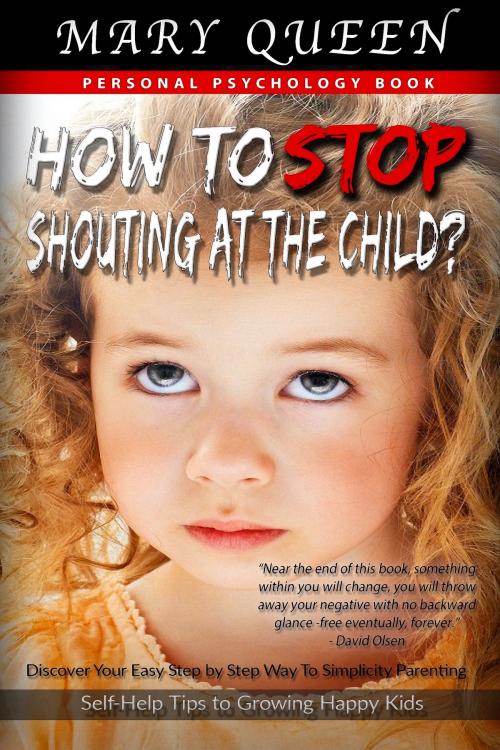How to Stop Shouting at the Child?
Discover Your Easy Step by Step Way to Simplicity Parenting (Self-Help Tips to Growing Happy Kids): Child Development, Child Support, Defiant Child, Connected Parenting, Mental Health
Nonfiction, Family & Relationships, Family Relationships, Conflict Resolution, Health & Well Being, Psychology, Mental Health, Parenting| Author: | Mary Queen | ISBN: | 9781533749406 |
| Publisher: | PublishDrive | Publication: | August 10, 2017 |
| Imprint: | Publishdrive | Language: | English |
| Author: | Mary Queen |
| ISBN: | 9781533749406 |
| Publisher: | PublishDrive |
| Publication: | August 10, 2017 |
| Imprint: | Publishdrive |
| Language: | English |
Often people see the upbringing as the imposition of their tastes, requirements, tasks, plans, and dreams, like, ‘I bring him up the way he must grow, I know what he should be aware, what he should do.’ If someone sees the upbringing in this way, my attitude to this is negative, and I would choose another word: help in child’s development, formation, nurturing.
Carl Rogers said that ‘an adult on a child could be compared to a gardener helping a plant. The gardener’s job is to supply water, provide the facility with the sunlight, fertilize the soil. That is, to create conditions for development but not to pull the top.’ If you pull the top in a direction that you chose, you won’t grow anything.
Dialogue is a bit narrowed concept, I’d better say, mutual understanding, the mood for understanding the child. Yes, it is important when the child knows his parent, but the parent can find out more about his child. And what does it mean to understand the child? First and foremost, it ways to know his needs and to take them into account. The person’s needs vary not only with age but individually, depending on the trajectory along which the child moves. Therefore, it is important to hear the child in a dialogue, to understand why he doesn’t listen to you, what are the reasons for his refusals and rudeness. If your discussion includes ‘to hear,' I accept it.
I reject any rough interpretations of the word ‘upbringing’ like if a child doesn’t listen, force him; if he talks rudely, corrects him; if he is offended, tell him, ‘there is nothing to be offended here, you are to blame for what has happened.”
Free Gift Inside ;)
Would You Like To Know More? This book is Delivered Instantly to Your Reading Device Just Scroll To The Top Of The Page And Select The "Buy Now" Button!
**Download Your Copy Today! **
© 2017 All Rights Reserved!
Often people see the upbringing as the imposition of their tastes, requirements, tasks, plans, and dreams, like, ‘I bring him up the way he must grow, I know what he should be aware, what he should do.’ If someone sees the upbringing in this way, my attitude to this is negative, and I would choose another word: help in child’s development, formation, nurturing.
Carl Rogers said that ‘an adult on a child could be compared to a gardener helping a plant. The gardener’s job is to supply water, provide the facility with the sunlight, fertilize the soil. That is, to create conditions for development but not to pull the top.’ If you pull the top in a direction that you chose, you won’t grow anything.
Dialogue is a bit narrowed concept, I’d better say, mutual understanding, the mood for understanding the child. Yes, it is important when the child knows his parent, but the parent can find out more about his child. And what does it mean to understand the child? First and foremost, it ways to know his needs and to take them into account. The person’s needs vary not only with age but individually, depending on the trajectory along which the child moves. Therefore, it is important to hear the child in a dialogue, to understand why he doesn’t listen to you, what are the reasons for his refusals and rudeness. If your discussion includes ‘to hear,' I accept it.
I reject any rough interpretations of the word ‘upbringing’ like if a child doesn’t listen, force him; if he talks rudely, corrects him; if he is offended, tell him, ‘there is nothing to be offended here, you are to blame for what has happened.”
Free Gift Inside ;)
Would You Like To Know More? This book is Delivered Instantly to Your Reading Device Just Scroll To The Top Of The Page And Select The "Buy Now" Button!
**Download Your Copy Today! **
© 2017 All Rights Reserved!















